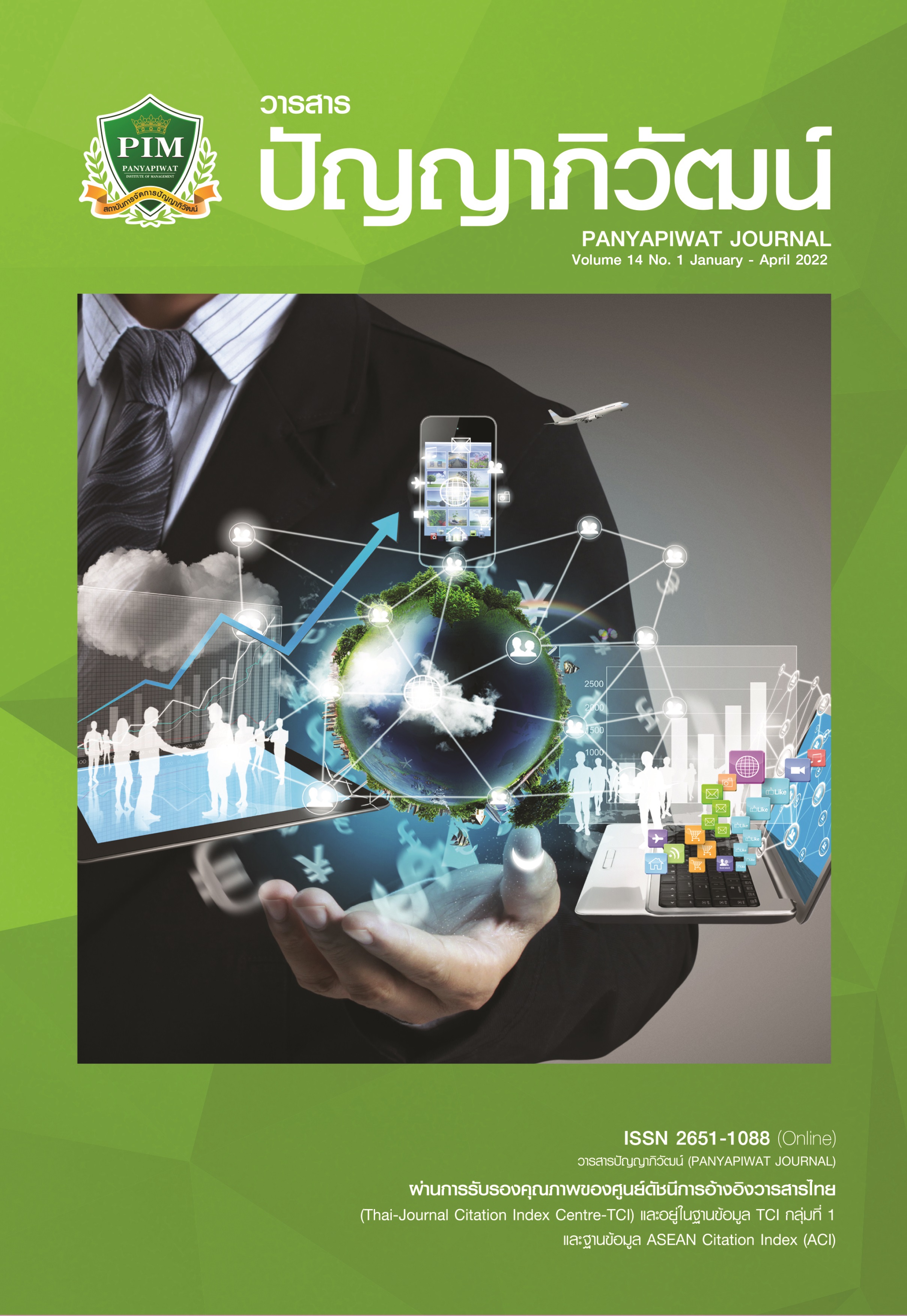วัฒนธรรมองค์การกับการสร้างสังคมสุจริต
Main Article Content
บทคัดย่อ
บทความเรื่อง วัฒนธรรมองค์การกับการสร้างสังคมสุจริตมีวัตถุประสงค์ เพื่ออธิบายการปลูกฝังความสุจริตให้กับองค์การทางสังคมด้วยแนวคิดวัฒนธรรมองค์การ โดยเชื่อมโยงวัฒนธรรมองค์การทั้ง 4 รูปแบบของเทพเจ้ากรีกโบราณ ได้แก่ วัฒนธรรมแบบสโมสร (Zeus) วัฒนธรรมแบบเน้นบทบาท (Apollo) วัฒนธรรม
แบบเน้นที่งาน (Athena) วัฒนธรรมแบบเน้นตัวตน (Dionysus) กับองค์การทางสังคม 7 องค์การ ได้แก่ 1) ครอบครัวสามารถใช้แบบสโมสร สมาชิกครอบครัวต้องประพฤติดีและอบรมสั่งสอนเรื่องความสุจริต 2) องค์การทางการศึกษาใช้แบบเน้นบทบาท ควรบริหารองค์การอย่างโปร่งใส และการใช้จรรยาบรรณวิชาชีพ 3) องค์การทางศาสนาใช้แบบเน้นบทบาท ควรปลูกฝังความสุจริตด้วยการใช้หลักธรรม พระธรรมวินัย ผู้นำเป็น
แบบอย่างที่ดี 4) องค์การชุมชนใช้แบบสโมสร ควรใช้ทุนทางสังคม ผู้นำาชุมชนเป็นแบบอย่างที่ดี 5) องค์การธุรกิจขนาดเล็กใช้แบบสโมสรควรให้ความรู้ การประพฤติตนเป็นแบบอย่าง สำหรับธุรกิจขนาดกลางและขนาดใหญ่ใช้แบบเน้นบทบาท ควรบริหารองค์การอย่างโปร่งใส การลงโทษ ให้ความรู้เรื่องความสุจริต สำหรับองค์การธุรกิจแบบเน้นงาน มีการปลูกฝังความสุจริตคือ การให้ความรู้เรื่องความสุจริต สำาหรับธุรกิจเฉพาะทาง เช่น โรงพยาบาลเอกชน บริษัทสถาปนิก สำานักงานกฎหมาย ใช้แบบเน้นตัวตน ควรใช้จรรยาบรรณวิชาชีพ 6) องค์การทางการเมืองการปกครองใช้แบบเน้นบทบาท ควรกำหนดนโยบาย ยุทธศาสตร์ และแผนที่เกี่ยวข้องกับ
ความสุจริต สร้างจิตสำานึกความสุจริต การใช้กฎระเบียบ และผู้นำาเป็นแบบอย่างที่ดี และ 7) องค์การสื่อมวลชนใช้แบบเน้นตัวตน ควรใช้จรรยาบรรณวิชาชีพ
Article Details

อนุญาตภายใต้เงื่อนไข Creative Commons Attribution-NonCommercial-NoDerivatives 4.0 International License.
“ข้าพเจ้าและผู้เขียนร่วม (ถ้ามี) ขอรับรองว่า บทความที่เสนอมานี้ยังไม่เคยได้รับการตีพิมพ์และไม่ได้อยู่ระหว่างกระบวนการพิจารณาลงตีพิมพ์ในวารสารหรือแหล่งเผยแพร่อื่นใด ข้าพเจ้าและผู้เขียนร่วมยอมรับหลักเกณฑ์การพิจารณาต้นฉบับ ทั้งยินยอมให้กองบรรณาธิการมีสิทธิ์พิจารณาและตรวจแก้ต้นฉบับได้ตามที่เห็นสมควร พร้อมนี้ขอมอบลิขสิทธิ์บทความที่ได้รับการตีพิมพ์ให้แก่สถาบันการจัดการปัญญาภิวัฒน์หากมีการฟ้องร้องเรื่องการละเมิดลิขสิทธิ์เกี่ยวกับภาพ กราฟ ข้อความส่วนใดส่วนหนึ่งและ/หรือข้อคิดเห็นที่ปรากฏในบทความข้าพเจ้าและผู้เขียนร่วมยินยอมรับผิดชอบแต่เพียงฝ่ายเดียว”
เอกสารอ้างอิง
Allport, G. W. (1967). Reading in attitude theory and measurement. John Welley and Sons.
Anantho, S., & Thongrin, S. (2016). Ethics in the media profession. Mahidol University Press.
[in Thai]
Anti-Corruption Organization of Thailand. (2017). Corruption cycle. Anticorruption. https://bit.
ly/2Tp2SbV [in Thai]
Balci, A., Ozdemir, M., Apaydin, C., & Ozen, F. (2012). The relationship of organizational corruption
with organizational culture, attitude towards work and work ethics: A search on Turkish
High School Teachers. Asia Pacifc Education Review, 13, 137-146.
Bodeerat, C., Adivadhanasit, C., Banchirdrit, S., & Suyaprom, S. (2013). The Buddhist Sangha
administration for Buddhism stability in region 4 of the Buddhistsangha administration.
The Golden Teak: Humanity and Social Science Journal, 19(1), 43-54. [in Thai]
Bustari, M. (2017). The institutional integrity of secondary schools. In C. S. A. Jabar (Ed.).
Yogyakarta International Conference on Educational Management/Administration and
Pedagogy (pp. 370-372). Yogyakarta State University.
Deal, T. E., & Kennedy, A. A. (1982). Corporate cultures: The rites and rituals of corporate life.
Addison Wesley Publishing Company.
Erikson, E. H. (1982). The life cycle completed: A review. W. W. Norton & Company.
Gregory, R. L. (1970). The intelligent eye. Weidenfeld and Nicolson.
Hitaguno, C. (2011). The role on Sangha Administration in Hua-Hin District, Prajaubkhirikhan
Province. Buddhism. https://bit.ly/3kHNkfh [in Thai]
Kotter, J. P., & Heskett, J. L. (1992). Corporate culture and performance. The Free Press.
Klein, S. M. (1996). A management communication strategy for change. Journal of Organizational
Change Management, 9(2), 32-46.
Mead, G. H. (1934). Mind, self and society. University of Chicago Press.
Miner, J. B. (1992). Industrial organization psychology. The State University of New York.
Jiang, M. M. (2015). Research on integrity thought in traditional Chinese culture and
contemporary value. In The 2015 International Conference on Social Science and
Technology Education (pp. 666-668). https://doi.org/10.2991/icsste-15.2015.178
Jeena, J., & Jeena, R. (2019). Ba Worn Santisook project: A participatory model of home, temple,
school for promote. Journal of MCU Peace Studies, 6, 47-60. [in Thai]
Jiang, Y. (2018). The role of traditional family motto in the moral cultivation of contemporary
youth. In E. McAnally (Ed.), The 3rd International Conference on Contemporary Education, Social Sciences and Humanities (pp. 1573-1576). People’s Friendship University.
Jittaruttha, C. (2017). Organizational culture. Chulalongkorn University Press. [in Thai]
Kohlberg, L. (1976). Moral stages and moralization: The cognitive developmental approach.
Holt, Rinehart and Winston.
Moral Center Thailand. (2015). Study project to create media moral courses. Moral Center
Thailand. [in Thai]
Moral Center Thailand and Institute for Population and Social Research, Mahidol University.
(2015). Report development of moral image scorecard of the government sector in
Thailand. Mahidol. https://bit.ly/2KXv6H4 [in Thai]
Murni, S., & Tanod, M. J. (2018). Maintaining family integrity through family counseling approach
in the information technology advancement era. In Non Formal Education International
Conference: Advances in Social Science, Education and Humanities Research (pp. 146-148). Universitas Negeri Padang.
Office of Public Sector Anti-Corruption Commission. (2018). The national strategy on the
prevention and suppression of corruption. Anticorruption. https://bit.ly/3bWbe3J
[in Thai]
Office of the National Economics and Social Development Council. (2019). Corruption perception
index. UBU. https://bit.ly/2PZkj1y [in Thai]
Erikson, E. H. (1982). The life cycle completed: A review. W. W. Norton & Company.
Gregory, R. L. (1970). The intelligent eye. Weidenfeld and Nicolson.
Hitaguno, C. (2011). The role on Sangha Administration in Hua-Hin District, Prajaubkhirikhan
Province. Buddhism. https://bit.ly/3kHNkfh [in Thai]
Kotter, J. P., & Heskett, J. L. (1992). Corporate culture and performance. The Free Press.
Klein, S. M. (1996). A management communication strategy for change. Journal of Organizational
Change Management, 9(2), 32-46.
Mead, G. H. (1934). Mind, self and society. University of Chicago Press.
Miner, J. B. (1992). Industrial organization psychology. The State University of New York.
Jiang, M. M. (2015). Research on integrity thought in traditional Chinese culture and contemporary value. In The 2015 International Conference on Social Science and Technology Education (pp. 666-668). https://doi.org/10.2991/icsste-15.2015.178
Jeena, J., & Jeena, R. (2019). Ba Worn Santisook project: A participatory model of home, temple,
school for promote. Journal of MCU Peace Studies, 6, 47-60. [in Thai]
Jiang, Y. (2018). The role of traditional family motto in the moral cultivation of contemporary
youth. In E. McAnally (Ed.), The 3rd International Conference on Contemporary Education, Social Sciences and Humanities (pp. 1573-1576). People’s Friendship University.
Jittaruttha, C. (2017). Organizational culture. Chulalongkorn University Press. [in Thai]
Kohlberg, L. (1976). Moral stages and moralization: The cognitive developmental approach.
Holt, Rinehart and Winston.
Moral Center Thailand. (2015). Study project to create media moral courses. Moral Center
Thailand. [in Thai]
Moral Center Thailand and Institute for Population and Social Research, Mahidol University.
(2015). Report development of moral image scorecard of the government sector in Thailand. Mahidol. https://bit.ly/2KXv6H4 [in Thai]
Murni, S., & Tanod, M. J. (2018). Maintaining family integrity through family counseling approach
in the information technology advancement era. In Non Formal Education International
Conference: Advances in Social Science, Education and Humanities Research (pp. 146-148). Universitas Negeri Padang.
Office of Public Sector Anti-Corruption Commission. (2018). The national strategy on the
prevention and suppression of corruption. Anticorruption. https://bit.ly/3bWbe3J [in Thai]
Office of the National Economics and Social Development Council. (2019). Corruption perception
index. UBU. https://bit.ly/2PZkj1y [in Thai]
Tuntirojanawong, S., & Tawisuwan, S. (2009). Promotion of effective virtue case studies of
children, youth and government officials. ARA. https://bit.ly/2ZoFZGE [in Thai]
Vorakitpokatorn, S. (2009). Complete research report, features and process of implantation
morality and ethics in Thailand. National Institute for Child and Family Development, Mahidol University. [in Thai]
Wallipodom, S. (2019). Cultivation. Lek Prapai. https://bit.ly/2XEUcyI [in Thai]


